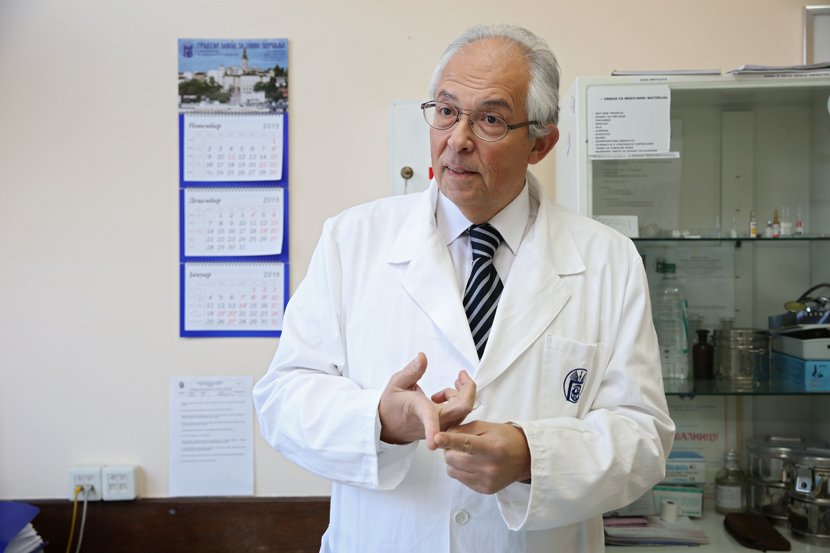Serbia - 12 dead from measles, Czech Republic - 12 sick in February: What are the penalties for unscrupulous parents and how does the anti-vaccine lobby work? (PHOTO) (VIDEO)
There is a lack of trust in the safety of vaccines in Europe according to the worldwide research on vaccines reliability in 2016. Although 89,000 people die every year from smallpox around the world, mostly in developing countries, a proportion of the population, especially in Europe, opposes the vaccination nevertheless. From October until today, 3,732 people have been infected with smallpox in Serbia, and 12 people died from complications caused by measles. The health situation in the Czech Republic seems to be a bit better, but 12 cases of smallpox disease were recorded in this country in February.
They almost completely eliminated the measles in the Czech Republic 10 years ago, but the negative trend against vaccination, existing in this country, has contributed to the appearance of many cases of smallpox when 150 people were infected in 2014 and 2016. 145 people were infected last year. There hasn't been a single death recorded in the Czech Republic since 1980 due to complications caused by smallpox.

WHICH ARE THE MANDATORY VACCINES?
After the break-up of Czechoslovakia, the system that existed in the then common state continued to function in the Czech Republic itself. Initially, in the "independent state" to say, 10 vaccines had been mandatory in the program of immunization of the population. Today, this number is lower by one vaccine.
As part of the mandatory immunization program, the Czech Republic has nine mandatory vaccines in the system against: whooping cough, diphtheria, tetanus, Influenzavirus B, hepatitis B, childhood paralysis, as well as smallpox, rubella, and Mumps vaccines, which are covered by MMR vaccine.
- We had a BCG vaccine for tuberculosis for years, but we decided not to include it in the universal program because we had controlled numbers - 5 patients per 100.000. Therefore, there was no need to stick to the mandatory schedule for tuberculosis - the professor Roman Prymula said to Telegraf.rs, the deputy minister of health of the Czech Republic.

There are 11 vaccines on the list of mandatory vaccines regulated by Law on the Protection of Population from Infectious Diseases in Serbia. The mandatory active immunization of a person of a certain age is carried out prevent infectious diseases: tuberculosis, diphtheria, tetanus, childhood paralysis, whooping cough, smallpox, rubeola, mumps, hepatitis B, haemophilus influenzae type B and streptococcus pneumonia.
THE DATA ABOUT THE NUMBER OF PATIENTS
In our country, 3,123 persons were affected by measles, of which 1,581 cases were confirmed in a laboratory in the Institute "Torlak". They took the first life on 27 December 2017, and the 12th just a few days ago when a person died due to complications caused by measles.
Today, five months after the smallpox epidemic in Serbia has erupted, there are practically no locations in the country without a case of measles recorded. The epidemic, primarily, was reported in Kosovo and Metohija, whereas at the beginning there was the largest number of sick people, however, this infamous first place was quickly overtaken by Belgrade.

According to Prof. Dr. Branislav Tiodorovic, this city is currently the most vulnerable, which isn't the case for Vojvodina and the east of the country where vaccination coverage is the best.
- Vaccination coverage is the worst in Nis and Belgrade, and therefore these two cities have the highest risk of illness spreading. Vojvodina is the safest, because it is, as always, the most promot in vaccination, and eastern Serbia proved just as good - prof. Dr. Tiodorovic said to Telegraf.
There are no logs for immunization in the Czech Republic, therefore they don't know what is the exact number of sick and the number of children that received the vaccine. However, they plan on changing that fact soon.
- We are currently negotiating with IT sector to form the logs for the next year. We have a system on the basis of which we supply data to the European Union (EU), where we take data each year for one letter of the alphabet. We count how many children with a name starting with a particular letter were immunized for that season, but that system is not accurate. We have even recently changed the order of immunization. For years, we had a 3 + 1 system, like many western countries. But we have introduced the system 2 + 1 from 1st January, we are saving one vaccine - prof. said Prymula, who is also chairman of the Vaccine Board in the Czech Republic.

Although there has been vaccination of health workers with MMR vaccine in Serbia since the start of the epidemics of measles since October last year, there are no such mandatory MMR vaccines for the same personnel in the Czech Republic.
It is currently proposed by the health ministry of Chech Republic to introduce mandatory MMR vaccination within two professions in the system, for workers in the departments of infective clinics and emergency services.

PENALTIES FOR NON-VACCINATION
There are penalties in the Czech Republic for parents who refuse to vaccinate children, but according to Professor Prymula, one of the leading healthcare experts, they are trying not to apply them often. Parents in the Czech Republic who pay a fine are not obliged to vaccinate their children afterward.
- It's a possible penalty, but it's not used so often. If used, it is based on a specific procedure that begins with the state services. They get a report by a pediatrician and if something is wrong, they investigate, and after that, they can file a lawsuit and parents can pay a fine of 10,000 CZK (which is just under 400 euros or 46,331 RSD). The balance of acceptance of the vaccine is a fairly narrow space, which is why we do not like to practice penalties.
The prevention of compulsory immunization in our country is considered a violation, and doctors are obliged to notify the sanitary inspection if the parents refuse to vaccinate the child. In Serbia, a total of 781 reports were submitted to the Misdemeanor Court for the refusal of vaccination last year, and the penalties for rejecting the vaccines ranged from 30,000 to 150,000 dinars.

ADVOCACY AGAINST VACCINATION
It is necessary for 95% of the children to receive vaccination for the collective immunity, the higher the number of non-vaccinated children, the risk of epidemics is higher. Groups that fight against vaccination have contributed to the smaller number of vaccinated children around the world and for causing the epidemics of measles in Europe. They attribute MMR vaccine that it causes autism and other diseases although there isn't a single proof of that claim. The anti-vaccination campaign lasts since 2009 in Serbia, and misdemeanor charges were filed against certain people who called upon others in public not to vaccinate their children.
The Czech Republic is struggling with the same problem and there are two groups that have strong anti-vaccination attitudes. The anti-vaccine lobby in the Czech Republic has fierce debates on social networks and platforms that are protected by codes, which can not be accessed by anyone. These create big problems in the health system, and those who disagree with them about vaccination, they are soon expelled from groups. Their primary goal is to stop immunization.
- If they ask me what should be their proposal for an immunization decree, they would say just to remove immunization and they would be happy. We fight with them, we have public hearings involving people from the Ministry of Health. Sometimes we can discuss with them, sometimes not, due to their unrealistic approach and just want to postpone immunization. I do not think that autism is their main goal against vaccination, but because they do not want to be in the system that is mandatory. Generally, these groups believe that it violates their freedom, that the children are a property of parents and that we must not interfere - prof. Prymula said.

The health ministry of Czech Republic still hasn't started on the public campaign for vaccination and they don't have the sites that would advocate why the immunization is important, it is limited only to health workers, institutions, and professionals, for now. However, the Ministry recently issued an action plan for vaccination, where they plan on launching sites regarding vaccination and immunization programs, telephone lines, information packages...
CONNECTION WITH AUTISM
Many parents in fear of autism actually risk the health of their children deciding not to vaccinate them. The only thing that prevented them from getting this vaccine is the fact that it is received at the same time when autism appears. A child can get this disease in that period, whether it was vaccinated or not.
In this regard, "Batut" institute has no records since 2006 of anyone being affected by autism after receiving the vaccine. Even the parents of the children who got this vaccine and who got autism afterward claim that this isn't due to this injection.
The risk of autism is much smaller in relation to the risk of contracting smallpox and up to 10 generations in Serbia are susceptible to it. According to the epidemiologist Predrag Kon from the Institute for Public Health of Belgrade, those are all the generations born between 1971 to 1982, even to 1993 because everybody was vaccinated with one dose.

- Everybody who received two doses of MMR vaccines has vaccine protection that is similar to natural immunity, but it is not enough to prevent the occurrence of the disease, which again depends on the immunity and the collective where the person reside - Dr. Kon said to our portal.
THE OTHER SIDE OF THE PROBLEM
The Association of Alternative Medicine of the Czech Republic considers that the citizens should be better informed regarding vaccination and they stress that the majority is for mandatory vaccination, but they question the quality of the vaccines themselves. Miroslava Pohunkova from the Association said to Telegraf.rs that it is up to every parent to provide maximum attention to the child regarding health and immunity.
One of the problems is that people with poorer social income are the most vulnerable. They are, in her words, under the pressure of the media they follow, and that they are afraid of them.
- Even if they get vaccinated, they don't have good immunity because they eat poorly, they don't have a quality life. They reflect the negativity of these vaccines, but it is not seen that the wide range of things around them is wrong.

Pohunkova recommends to the parents who come to her pharmacy the doctor who has an individual approach to every little child regarding vaccination.
- That is the only doctor in the vicinity who approaches each patient and makes the combination of vaccines suited for the specific child. That is done in accordance with the law so that neither parents nor the child is burdened. And the child will be protected in an adequate way since the doctor knows that the child needs - Pohunkova said, but she stresses that the vaccines are used with younger generations that contain aluminum, which effects to the degenerative processes in the brain and the other parts of the body. That presents the only problem of today's vaccines for her today.
Prior to the introduction of the smallpox vaccine, which has been in use for almost 50 years, it is estimated that approximately 2.6 million people have been affected annually every year. Last year in Europe, 21,000 cases of smallpox were recorded, a fourfold increase compared to the previous year.
This year, the number of patients has risen by 400 percent, with more than 20,000 cases reported, of which 35 are fatal. The epidemics have been recorded in 15 countries in Europe, and most cases are in Romania,, Italy and Ukraine.
What are the vaccines and how do they work?
(Telegraf.co.uk / Natasa Ivanovski)
Video: Koncert Tamare Rađenović u Sava Centru
Telegraf.rs zadržava sva prava nad sadržajem. Za preuzimanje sadržaja pogledajte uputstva na stranici Uslovi korišćenja.

